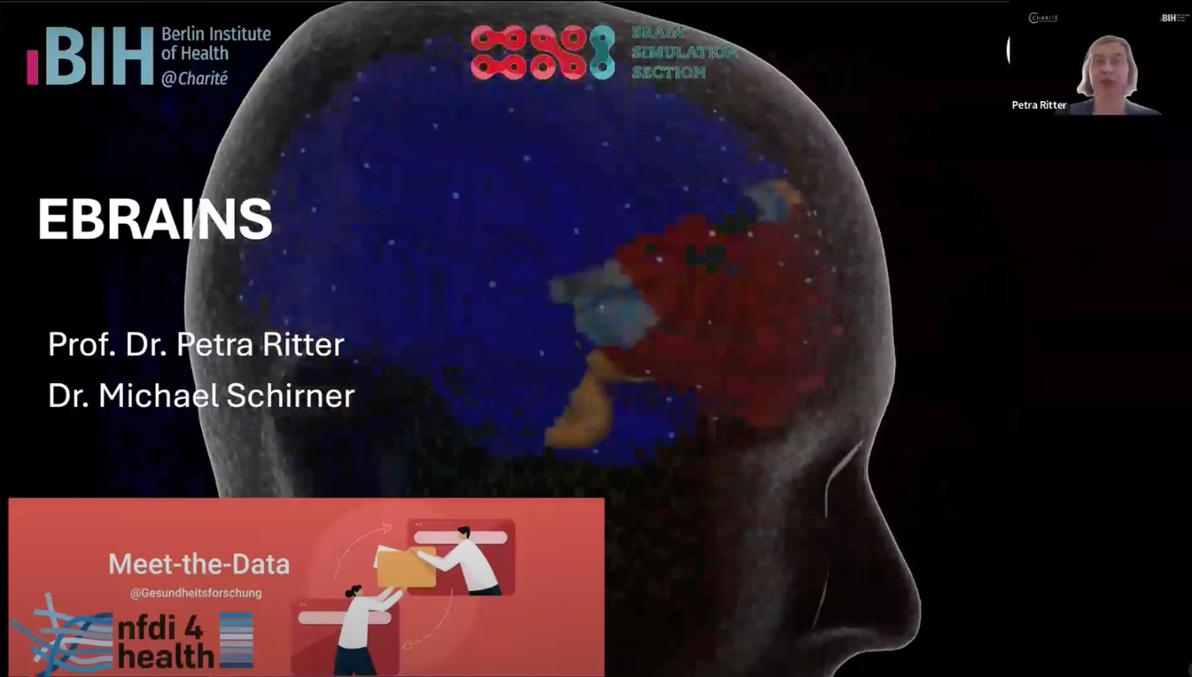Missed the latest Meet-the-Data @HealthResearch webinar? Catch up now with the full replay of Prof. Petra Ritter and Dr. Michael Schirner's insightful presentation on the EBRAINS Health Data Cloud, a cutting-edge platform advancing secure, GDPR-compliant neuroscience research across Europe.
On July 9, 2025, Prof. Petra Ritter and Dr. Michael Schirner joined the Meet-the-Data @HealthResearch webinar series to introduce the EBRAINS Health Data Cloud — a powerful digital infrastructure supporting neuroscience research in Europe.
The session offered an accessible overview of how the platform works, what it enables, and why secure and compliant data handling is so essential in brain research today.
If you missed it, the full recording is now available online.
Key Takeaways from the Webinar
EBRAINS Health Data Cloud Overview
Developed as part of the 10-year Human Brain Project, the EBRAINS Health Data Cloud brings together data, tools, and infrastructure to support collaborative and privacy-conscious brain research. It provides researchers with access to datasets, atlases, modeling services, and simulation tools, all built to meet the highest standards of data protection under GDPR.
The Virtual Brain Integration
A key feature of the platform is its integration of The Virtual Brain, open-source software released in 2012. This tool allows researchers to simulate individual brain dynamics using multimodal data, making it possible to explore complex brain activity in a reproducible and transparent way.
Smart Data Management and Discovery
All data within the cloud is carefully annotated and discoverable through the EBRAINS Knowledge Graph, a searchable interface that links datasets, software, and models. Sensitive data are hosted within the Charité Trusted Virtual Research Environment, ensuring both accessibility and security through structured sharing agreements.
Ensuring GDPR Compliance
The platform takes compliance seriously. A structured five-step onboarding process helps researchers ensure they meet all GDPR requirements. Users are supported in defining their roles (as data controllers or processors) and in using the Virtual Research Environment (VRE), a secure workspace for processing sensitive brain data using standard Linux or Windows environments.
Legal and Ethical Frameworks
The webinar also covered the legal aspects of processing health data under GDPR. Data controllers must identify a legal basis for processing, typically through consent, scientific purpose, or legitimate interest, and put appropriate safeguards in place. These include early involvement of a data protection officer, risk assessments, and incident response plans like the “green room” staging procedure for data.
Replay the Webinar
The webinar is now available to watch online. Whether you’re already working with EBRAINS or just curious about how GDPR-compliant data platforms work in practice, this session provides a clear and practical overview.
Watch the full session here:
Looking Ahead
The EBRAINS Health Data Cloud is more than just a tool, it’s part of a broader movement toward secure, collaborative, and ethically grounded neuroscience. As research becomes increasingly data-driven, platforms like this will be key to ensuring that innovation and privacy go hand in hand.
Learn more and explore the platform at: https://www.healthdatacloud.eu
